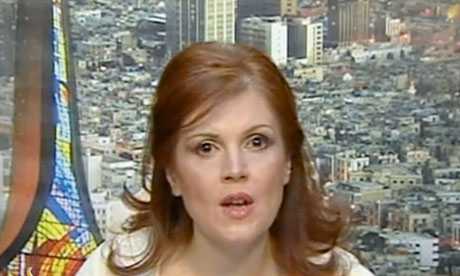Reem Haddad puts spin on the desperate attempt of hundreds of locals to flee Jisr al-Shughour before government clampdown
Esther Addley
guardian.co.uk
Reem Haddad

She may look like the actor Isla Fisher and speak like a Mayfair lady who lunches, but appearances – and words – can be deceptive. As hundreds of refugees fled the Syrian border town Jisr al-Shughour on Thursday, desperate to avoid an expected government clampdown after the killing earlier this week of 120 soldiers, Reem Haddad , the director of Syria’s state TV network, gave an interview to the BBC to account for the crowds pouring into Turkey.
Many have relatives in villages just the other side of the border, she said. “A lot of them find it easy to move across because their relatives are there. It’s a bit like having a problem in your street, and your mum lives in the next street, so you go and visit your mum for a bit.”
As Syria’s security and humanitarian crisis escalates, Haddad, who acts as a spokeswoman for the country’s information ministry, has become one of the most familiar faces of President Bashar al-Assad’s regime, with a talent for insisting on innocent explanations for the brutal government response to the protests.
In this she has drawn comparisons to Muhammad Saeed al-Sahhaf, whose exuberant insistence on behalf of Saddam Hussein’s government that the Iraqi army was invincible earned him the nickname Comical Ali before the 2003 allied invasion.
Little is known about Haddad’s early career to date, though her father served as Syria’s ambassador to East Germany and is said to have modelled Syria’s secret police on the Stasi.
“I don’t think she believes all of what she’s saying, though I think she believes some of it,” Amr al-Azm, a former colleague at a Damascus language school in the early 1990s, told the Times. “She believes there’s a war here between two ideologies, two groups, and she believes she’s on the right side.”
Would the government allow the gathering protesters to make their demonstrations peacefully, she was asked by al-Jazeera in late April.
There were no demonstrators, she said. On the contrary, said the journalist, many people on the ground were reporting gathering crowds.
“I know, you have this ‘eyewitness phenomenon’ thing,” replied Haddad. “But we have our cameras everywhere and we have seen no gathering at all.” In principle, however, demonstrations were permitted. “But they have to apply for a licence and they have to tell the police, and the police will tell them along which routes they should follow, and how long they should demonstrate and how many people there should be.”
The same broadcaster, some weeks later, asked about 500 civilians thought to have been shot dead by security forces in street protests (that figure is now more than 1,000). “How do you know that sir, may I ask?” replied Haddad. “How do you know that 500 people have been shot dead, where is your information coming from?” It was a figure compiled by human rights organisations in Syria and London, among others, said the journalist.
“But my dear they are sitting in London. How can they confirm anything!” The world should confirm its facts independently, said the spokeswoman, “rather than taking shoddy, shoddy if I may say, eyewitness accounts.” As Haddad well knows, all foreign journalists are banned from Syria.
via Syria’s state TV director tells BBC ‘refugees’ just visiting family in Turkey | World news | The Guardian.

Leave a Reply